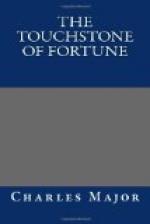When nearly two miles from the city, Crofts, Berkeley, and Wentworth met Roger’s coach and delivered the attack as silently as possible. Just the manner in which it was done I have never learned, since Hamilton himself did not know the particulars of it, and Frances told me it happened so quickly that it was over almost before she knew it had begun. She said the horses had stopped, which was not a matter of surprise to her, as they had been resting every few minutes, and that a man wearing a mask entered the coach, rummaged the cushions, and was backing out with the bag of gold in his hand when Roger seized him.
The robber was almost out of the coach, but Roger clung to him with one hand while he drew his pistol with the other and fired. Then the man tossed the bag of gold to one of his friends on the road, drew his sword, thrust it in Roger’s breast, and the poor old man fell back on the coach floor at my cousin’s feet. She heard some one call to Noah: “Drive on if you value a whole skin!” and Noah, awaiting no second command, lashed the horses with his whip until they plunged forward at a clumsy gallop.
Hamilton and Churchill, being perhaps two hundred yards down the road, knew nothing of the trouble ahead till they heard the pistol shot, when they ran forward, supposing their drunken friends were fighting among themselves. They had not taken many steps when a coach passed them, moving rapidly. As it passed, George heard a woman scream faintly, but immediately the coach dashed out of sight. The light from Noah’s lanthorn had fallen on Hamilton’s face, and Frances had recognized the man of whom she had been thinking and dreaming all day.
I did not know, however, till long afterwards that she had seen him, nor did he suspect that she was in the coach.
When Hamilton and Churchill came up to the robbers, Hamilton asked:—
“What was the trouble?”
“The damned old fool in the coach shot at me,” answered Crofts.
“How came he to do it?” asked Churchill, suspecting the truth.
“I do not know,” returned Wentworth. “He must have taken us for highwaymen, for he thrust his head out of the door and fired a pistol at Crofts, who was nearest the coach.”
“Yes,” said Crofts. “And he was about to fire again, point blank at my head, when I drew my sword and quieted him. Matters have come to a pretty pass when gentlemen can’t walk out on the public road without becoming a target for every frightened fool that travels in a coach. I’ll learn who this fellow is, and will see that he becomes acquainted with the interior of Newgate or dangles to a rope on Tyburn.”
“Shall we declare the wager off?” asked Wentworth, turning to Churchill and Hamilton.
“By all means,” answered Churchill.
All being willing to return, they started back to London, Wentworth, Berkeley, and Crofts falling behind. The story they had told was not convincing, but when Hamilton expressed his doubts to Churchill and intimated his belief that a robbery, if not a murder, had been committed, Churchill answered cautiously:—




